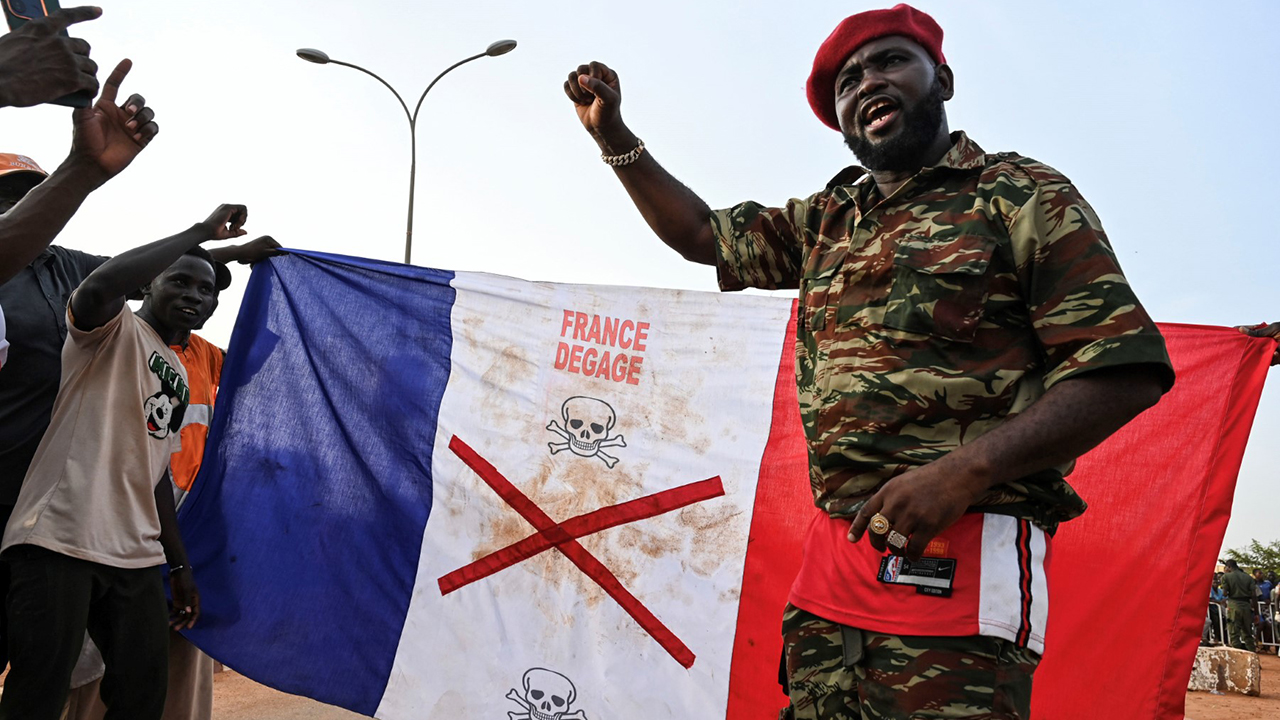
Since Paris had periodically rigged elections in its African possessions during the colonial era, it was easy for France to condone undemocratic behaviour on the continent. President Jacques Chirac described democracy as a “luxury” for Africa, demonstrating the prejudiced paternalism typical of the French political class, many of whose members – like Chirac himself – have themselves often been involved in sleaze and scandals. Paris’s unilateral 50 per cent devaluation of the CFA franc in 1994 further dealt a devastating blow to its Africa policy.
La Fin de la Chasse Gardée
President Nicolas Sarkozy (2007-2012) rode to power on the crest of Islamophobic xenophobia, having served as a right-wing interior minister who had increased police harassment of African and Arab immigrants. Uncouth, acerbic, and deeply prejudiced, during a speech in Dakar in July 2007, he argued that France might have made “mistakes”, but believed in its “civilising mission … and did not exploit anybody.” The French pseudo-philosophical president then incredibly noted: “Africans have never really entered history….In a world where nature controls everything, man has remained immobile in the middle of an unshakable order where everything is determined.
There is no room either for human endeavour, nor for the idea of progress.” This racist speech was widely condemned across Africa and its diaspora. Sarkozy continued to back dictators like Madagascar’s Didier Ratsiraka and Togo’s Gnassingbé Eyadéma. France had earlier provided military support to prop up the autocratic regimes of Chad’s Idriss Déby and CAR’s François Bozizé in 2006, with Sarkozy saving Déby’s regime again in 2008.
Emmanuel Macron has continued to promote these cosy and corrupt relationships. Despite rhetorical pretensions of pursuing a new approach in Africa, he has persistently treated the continent like a supplicant of the Françafrique system. Macron has defended the Déby family autocracy in Chad, backed Paul Biya’s 41-year misrule in Cameroon, and meddled in Libya on the side of the warlord, General Khalifa Haftar. The self-described “Jupiterian” president has continued Sarkozy’s Islamophobia and echoed his predecessor’s prejudice in 2017, notoriously describing Africa’s challenges as “civilisational”, before complaining that African women having seven or eight children was “destabilising” the continent.
Ghastly incidents involving the French military, for which Paris refused to take proper responsibility, have also exacerbated its deep unpopularity across Africa. In 2013, UN investigators released a report implicating French soldiers in the sexual abuse of children in CAR. No charges were brought against these predators. Another UN report noted that a 2021 French airstrike killed at least 19 civilian members of a wedding party in central Mali. France again refused to take responsibility. In recent times, anti-French protests have erupted in Bangui, Bamako, Ouagadougou, Conakry, N’Djamena, Dakar, and Abidjan, exposing the Gallic emperor’s nakedness.
Adieu, l’Afrique
Perhaps nothing better symbolises the death of the six-decade system of Françafrique than the spectacular collapse of France’s utterly failed decade-long counter-terrorism war in the Sahel. France effectively used regional soldiers as cannon fodder, without the resources or vision to pursue a developmental approach to peace building. The semi-arid Sahel now appears to represent France’s Afghanistan, as Paris – already expelled from its military base in Mali in 2022 – has recently been asked by putschists in Niger to withdraw its 1,500 troops from the country.
France’s support of autocratic and corrupt leaders like Chad’s murdered Idriss Déby – described by the French president as a “loyal friend” – has discredited its role in Africa. Macron’s hectoring, omniscient style has not gone down well on the continent. He spoke out of both sides of his mouth in condoning the coup d’état in Chad in 2021 and, only a few weeks later, condemning the military putsch in Mali. More recently, he excoriated the putschists in Niger, while embracing the soldiers in Gabon.
France has not been in the front ranks of global power for eight decades. Its seat on the UN Security Council is anachronistic. It is the seventh largest economy in the world, behind India, and is likely to be overtaken soon by Brazil. It still wields influence within the European Union, but it is clear that Germany is the continent’s leading power and paymaster. Paris actually cannot afford its politique de grandeur in Africa, and has increasingly sought to use the UN and the EU to subsidise its African adventures. French intervention on the continent, however, has now become a costly relic of a bygone age of imperial delusion.
Françafrique is finally dead. It is time to give it a decent burial.
Concluded
Professor Adebajo is a Senior Research Fellow at the University of Pretoria’s Centre for the Advancement of Scholarship in South Africa.






